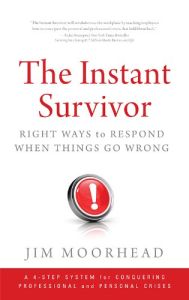Join getAbstract to access the summary!

Join getAbstract to access the summary!
Jim Moorhead
The Instant Survivor
Right Ways to Respond When Things Go Wrong
Greenleaf Book Group, 2012
What's inside?
How to survive and thrive when faced with a crisis
Recommendation
Every day at work, millions of people face personal or professional crises. Companies must deal with employees who are sick, broke or in distress, and the employees themselves must get through hard times. Part self-help book, part business book, this useful manual shows you a four-step system for surviving a major problem by “staying frosty, securing support, standing tall” and “saving your future.” Corporate crisis management expert Jim Moorhead draws on his personal experience and includes many heartbreaking examples from survivors of a range of calamities. He covers people who’ve made it through divorce, cancer and drug addiction. As a second theme, though it might be a small stretch, he cites useful experiences from companies faced with corporate emergencies like product recalls and public relations disasters. getAbstract recommends this practical guidebook to a wide audience: employees facing personal trials, HR managers and line managers supervising workers in crises, and executives facing corporate problems.
Summary
About the Author
Jim Moorhead lost a statewide election, and his employer – a fiber optics company – collapsed in the dot-com bust. He now coaches businesspeople and political candidates on managing personal and professional crises, and he comments on crisis management for major TV networks.


















Comment on this summary